Greek bailout dealpublished at 11:23 BST 13 July 2015
 Duncan Weldon
Duncan Weldon
Economics correspondent in Athens
Occasional updates and analysis from the Newsnight team
 Duncan Weldon
Duncan Weldon
Economics correspondent in Athens
 Allegra Stratton
Allegra Stratton
Newsnight Political Editor
The row this morning between Harriet Harman and almost all of the three leadership candidates is pretty serious. Over the weekend the acting Labour leader said she thought Labour would back Tory cuts to child tax credits for more than two children. She believes that she has a moment right now to reposition Labour on tax and welfare, and that in some ways she has the political cover to take very difficult decisions in a way the new leader may struggle to. Perhaps this is code for "not want to". Anyway, this is what she's doing. It's now Monday morning and Andy Burnham, Yvette Cooper and Jeremy Corbyn have all said she is wrong.
I've been talking to Labour MPs this morning and they are pretty worried. There is firstly concern about what this says for party unity. Labour backbenchers understand that Harman's position was discussed in shadow cabinet and that these leadership contenders are going rogue. I think this is a little unfair - they have a leadership contest to win by being distinctive and strident. But MPs fear that the chaos that ensues is causing lasting damage.
Perhaps more importantly is the sense this contest is being dragged to the left, again - perhaps in a permanent way. Some MPs report Andy Burnham having indicated he would be tougher in this leadership contest on welfare than he has so far been. It's suggested that he may even have made private comments that he understood people's concerns about too generous a welfare bill when trying to secure the nominations of his Labour colleagues. Since the leadership contest began in proper, he has not done that and these MPs feel very let down. Because Yvette Cooper has refused to say Labour ran too high a deficit going into the down turn she is less vulnerable than Andy Burnham on the left. Burnham has said the party must "own up" and admit the deficit was too high when in government. Perhaps for this reason Burnham is working hardest to get Jeremy Corbyn's second preferences.
Private research being done for the leadership contenders has shocked many by revealing quite how many party members sympathise with Jeremy Corbyn. Corbyn is a very smart man who I have always rather admired. When having a chat with him he’s prone to start waxing lyrical about William Morris. Just now he used the word "sophistry" in the Victoria Derbyshire hustings... A lot of former Labour cabinet ministers wouldn't dream of using that kind of word. Many people who are saying they will vote Corbyn tell the phone canvassers they joined the party in 2010, and then another chunk joined under Ed Miliband's leadership. The worry for some MPs is that Ed Miliband's lasting legacy may be to have brought in to the party these members who then end up making Labour's next leader more left wing than its modernisers want.
This evening's meeting of the parliamentary Labour party will see these issues raised and many of my sources are in the mood to lean in to the fight.
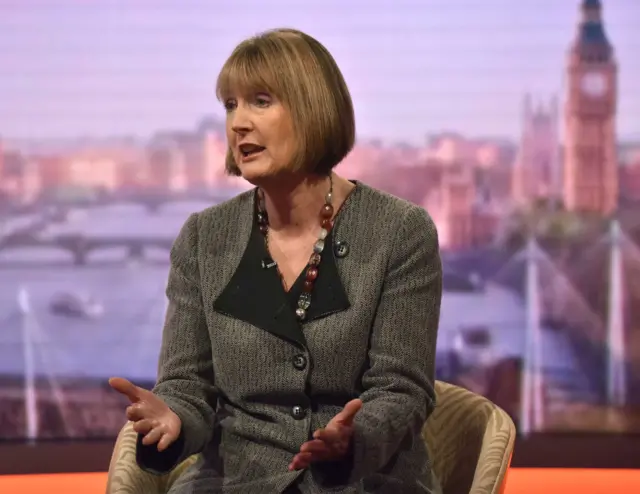
Harriet Harman, acting Labour leader
13th July
Stories today include Greece and the Labour leadership. Eurozone leaders have just agreed to offer Greece a third bailout deal after seventeen hours of talks in Brussels. Is this a final deal and what will it mean for Greece and the rest of Europe?
Labour MPs will hear from the party's acting leader, Harriet Harman, tonight after she backed some of the welfare cuts announced in last week's Budget. This caused a split among candidates for the leadership of the party with three out of the four candidates not supporting welfare cuts.
 Emily Maitlis
Emily Maitlis
Newsnight Presenter
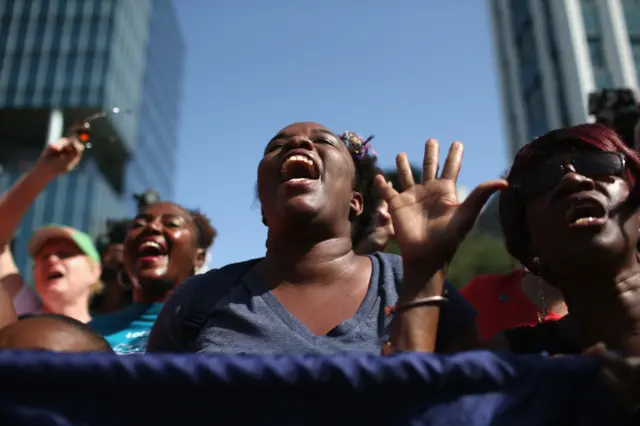 Image source, Getty Images
Image source, Getty Images"I have it on good authority - the world is watching us "
The breaking voice of Charleston Republican Jenny Horne, as she spoke to South Carolina House members in an emotionally charged plea - begging them to pass the legislation to bring down the Confederate flag that flies in the state capital, Columbia.
Today - to cheers and a gathering of thousands - that flag finally came down.
The flag that has Americas racial past woven into its fabric. The slavery, the segregation and the prejudice. The flag that last month came to symbolise not just America's past but its continuing divisions. It was clutched by Dylan Roof, the man who shot dead nine Black Americans as they prayed in church and declared he wanted to start a race war.
Onlookers today declared the moment the flag came down as the beginning of catharsis after a massacre that still had the power to shock a nation.
But the Confederate flag is only momentarily dead, not buried. It will no longer fly alongside the Columbia statehouse. But look closely and you'll find it imprinted in the state flag of Mississippi. A state that has its own share of ghosts from its civil rights struggle.
Will Mississippi now follow where South Carolina has led? Or will that American insistence on free expression ensure their state flag continues to fly proudly.
 Image source, Getty Images
Image source, Getty ImagesSpot anything in the top left?
 Lewis Goodall
Lewis Goodall
Newsnight producer
We all know the story of Johnny Mercer and those bulging biceps, external. Many a researcher in Parliament has doubtless been looking at him anew (I only hope for his sake he doesn't become the Aaron Shock of Parliament).
Sometimes politicians turn up where you least expect them, for example,this ad featuring Denis Healey. A man who knows a thing or two about taking out credit, the former chancellor starred in this gem for Visa card:, external
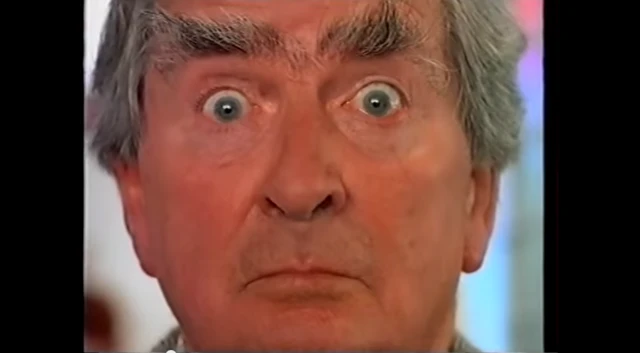 Image source, Mastercard
Image source, MastercardPerhaps nothing beats Neil Kinnock turning up on a Tracy Ullman video, external
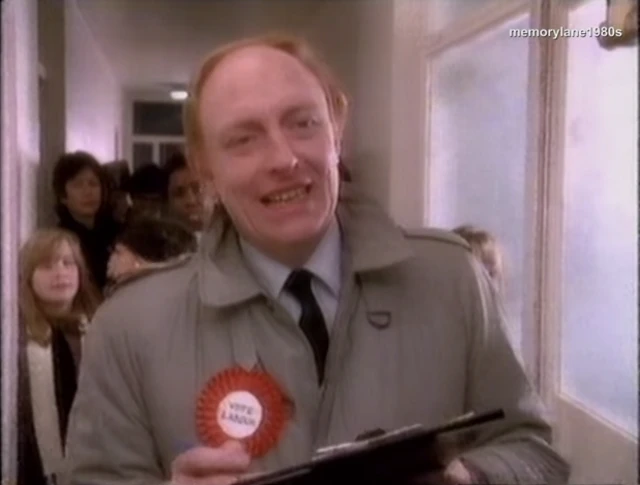 Image source, Universal
Image source, UniversalOr Margaret Thatcher on Coronation Street:, external
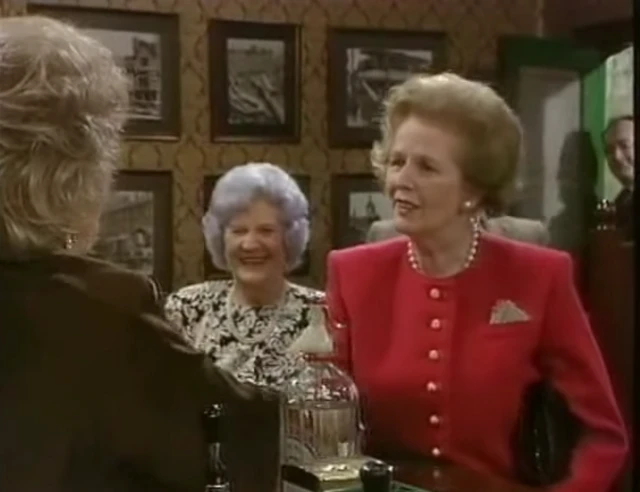 Image source, Granada
Image source, GranadaThe Americans are at it as well. I'm never without my Boraxo powder soap:, external
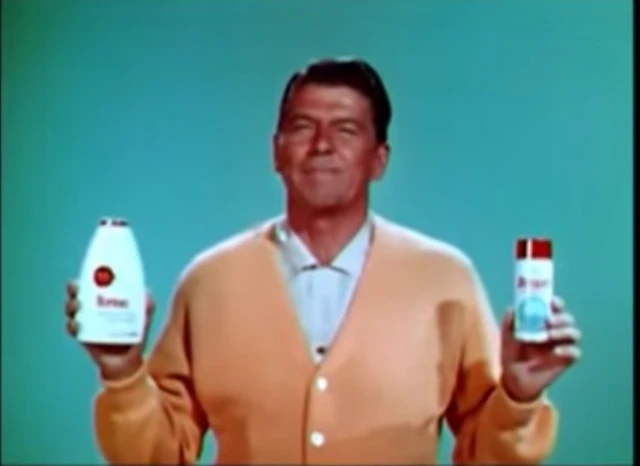 Image source, Boraxo
Image source, BoraxoNot a real politician but Francis Urquhart (aka Ian Richardson) did a good turn for Rover in the 90s., external
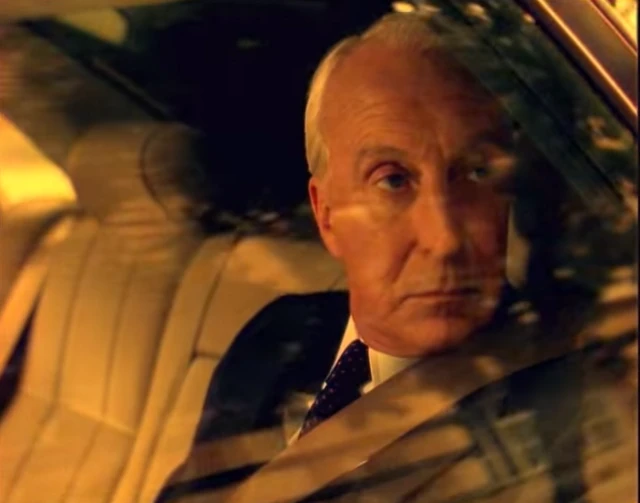
You might very well think that, I couldn't possibly comment...
...who stays in the shadows
Chris Cook
Newsnight Policy Editor
Over at my blog, I've written a long piece about the most powerful person you've never heard of. How powerful? This powerful:
Quote MessageWhen Labour wants to propose someone for a peerage, they ring her on the phone. She then gives them an oral "yes" or "no" as to whether they are likely to get through vetting. The party accepts her verdicts, but there are no records and she never explains herself. There is simply no check on what basis she performs the first sift on House of Lords membership.
The most powerful person you've never heard of
Richard Crook, Newsnight producer
The Chinese government appears to have relaxed their ban on exhibiting the work of dissident artist Ai Weiwei. Four shows have now opened with no interference from authorities.
China banned exhibitions of Ai Weiwei's work in 2011, after he was arrested as part of a crackdown on bloggers and activists. He is still not permitted to leave the country.
The lack of official opposition has come as a surprise to the internationally renowned artist. "I never planned to have a few shows all at once," he told The Art Newspaper. "I was not sure it would happen until the [first] opening."
In 2012, he spoke to Newsnight about his hopes to travel to London to see the sunken pavilion he had designed for the London 2012 Festival. He also spoke about his life under house arrest, where all his activities are regulated, and how he is still able to communicate with his followers on Twitter. You can view the video below.
In September, his work will be on display at the Royal Academy in London.
Allow YouTube content?
This article contains content provided by Google YouTube. We ask for your permission before anything is loaded, as they may be using cookies and other technologies. You may want to read Google’s cookie policy, external and privacy policy, external before accepting. To view this content choose ‘accept and continue’.
 Duncan Weldon
Duncan Weldon
Economics correspondent
Robert Morgan, Assistant Editor, Newsnight
It's been confirmed that MPs will vote next Wednesday on whether to relax the ban on fox-hunting. The Government is bringing forward measures to bring England and Wales into line with Scotland, where hunts can use an unlimited number of dogs to chase, but not kill foxes.
Queen guitarist and animal welfare campaigner Brian May and Jim Barrington, a welfare consultant to the Countryside Alliance, appeared on Newsnight last night to debate the government plans to relax the ban on fox hunting. It was a robust exchange. You can watch the discussion below. It includes strong language which some viewers may find offensive.
Allow YouTube content?
This article contains content provided by Google YouTube. We ask for your permission before anything is loaded, as they may be using cookies and other technologies. You may want to read Google’s cookie policy, external and privacy policy, external before accepting. To view this content choose ‘accept and continue’.
 Duncan Weldon
Duncan Weldon
Economics correspondent
10th July
Stories today include the latest in the Greek debt crisis. Will the Greek government's new proposals lead to a deal with creditors?
 Emily Maitlis
Emily Maitlis
Newsnight Presenter
Often, in this job, you receive the group email that gives you the departmental or party spin on whatever has just happened. For example Lib Dem Lords sending out a "Whitehall Warning" on the security problems that the selling off of assets will cause.
Sometimes they sparkle with wit and excitement. And more often they don’t. But rarely, in this job, do you get the ones that read your own mood so appropriately. Today, we did. A round robin email from the Treasury reached us this afternoon with the word
"Dear". And then a blank.
And then the three words
"Blah blah blah".
And then the cordial salute
"Regards."
Arguably it told us no more and no less than usual. But this one, it must be said, seemed to chime with a sense of post budget, pre-holiday, languid, sunshiny end of week exhaustion. And in an era where we are constantly demanding that politicians and their advisors" speak human," this time they did.
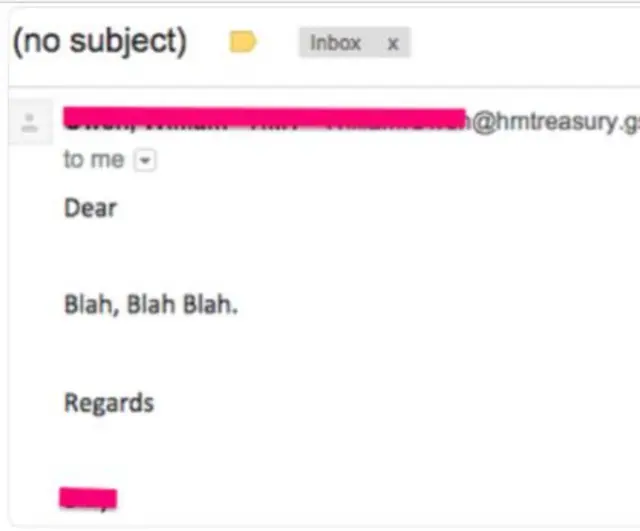
 Duncan Weldon
Duncan Weldon
Economics correspondent
Over at my BBC blog, I've got some considered reaction to yesterday's budget.
The move on the National Living Wage is very big and represents a significant change in how the government sets policy towards the labour market.
That, and a half dozen other measures, suggest a shift in how George Osborne's Chancellorship will be viewed.
The IFS spills the beans on Osborne's tax and benefit changes
 Ed Brown
Ed Brown
Newsnight producer
Yesterday, a couple of us in the Newsnight office were a little bit confused. We wondered why, unlike in previous years, the Government had not published what's called a "distributional analysis" of the impact of the 2015 summer budget. It told us the cumulative effect of the last six years of changes, including under the coalition - which is rather different.
Now, helpfully the IFS have done one. Before you look at it, a quick explainer on how to read these charts. If the line slopes downwards (as you read from left to right), the budget is "progressive" - it helps out poor people more than it helps out rich people. If the line slopes upwards (as you read from left to right), the budget is "regressive" - it helps out rich people more than it helps out poor people.
Here it is:
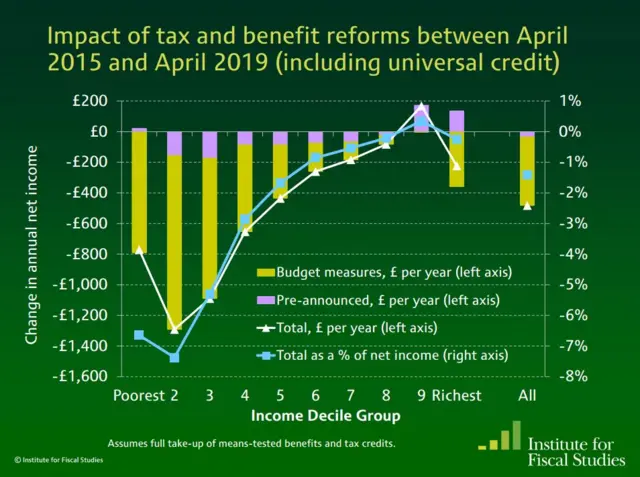 Image source, IFS
Image source, IFSSo, pretty unambiguously regressive.
Now, of course, if you think that benefits and taxes are too high then this is a good thing. Low income people receive more benefits, high income people pay more tax, so readjusting the system like this is for the good.
And the Government might argue that much of this will be counteracted by the higher minimum wage anyway. That's true - although the IFS point out that for most people on tax credits, for example, the minimum wage won't counteract the change.
I suspect part of the reason why is this: a lot of people claiming tax credits will be working relatively few hours. If you work relatively few hours (for example because you have to look after children), the extra cash from having a higher minimum wage (or "national living wage" in Osborne's language) is much lesser. The more you work, the more extra cash you earn - see this chart (the red area is the extra cash from the living wage):
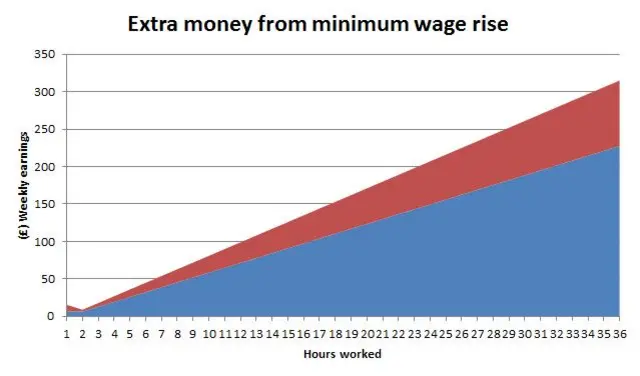
Tax credits, broadly speaking, work the other way around. As you earn more and more, the cash value of them decreases. So you can see why the lowest earners get hit - they lose most from tax credits and gain least from higher minimum wages.
 Duncan Weldon
Duncan Weldon
Economics correspondent
Did he rule them out before the election?
 Ed Brown
Ed Brown
Newsnight producer
On 31 March 2015, David Cameron appeared on the Question Time Election Leaders Special. The very first exchange was as follows:
Questioner: "Will you put to bed rumours that you plan to cut child tax credit and restrict child benefit to two children?"
David Cameron: "Well thank you Jenny for that question. No, I don't want to do that, this report that was out today was something that I rejected at the time as prime minister and I reject it again today".
He finishes his answer by pivoting to the successes of his benefits cap.
But Dimbleby clarifies with the Prime Minister: "Sorry – you said you didn’t want to put to bed the rumours that you were going to cut Child Tax Credits, you meant you did want to put to bed the rumour?"
Cameron: "Ah, yes. We increased child tax credits actually, we increased them by £452 under this government because I was determined that while we had to take difficult decisions, and we have, we were left an absolute nightmare to clear up, I wanted to make sure that child poverty continued to fall and it has fallen because of what we did on child tax credits."
Dimbleby: "And so that’s a guarantee that you won’t" (moves on to audience member who asks about benefit cap)
In the run up to the Budget, my colleague Allegra Stratton reported that the Government was looking at options on how to make changes to child tax credits.
Sure enough, George Osborne, presumably with David Cameron's blessing, announced that the Government was going to limit child tax credit for people with more than two children.
He also made other changes, including increasing the rate at which it was withdrawn from people as they got more work (the "taper rate") from 41% to 48%, and reducing the level of income at which it would be withdrawn. They also froze the level of tax credits.
The effect of all of these measures is that the Government will be spending less on tax credits than it would have been if it hadn't done them - to the tune of billions. We know this because the budget book tells us so.
I leave it to you as to whether what George Osborne announced yesterday on tax credits was consistent with what David Cameron told the Question time audience before the election.
But, if you're interested, here's how David Gauke reacted after being played the first half of that clip yesterday on Newsnight:
Allow YouTube content?
This article contains content provided by Google YouTube. We ask for your permission before anything is loaded, as they may be using cookies and other technologies. You may want to read Google’s cookie policy, external and privacy policy, external before accepting. To view this content choose ‘accept and continue’.
James Clayton, Newsnight Political producer
For five years Conservatives have harped on about the onerous limitations imposed on them by the Liberal Democrats. Strange then that the first truly Conservative budget for nearly 20 years was heavily influenced by Labour.
Osborne's policy on the living wage, non-doms and crucially the one year slip on deficit reduction target were all in the manifesto. The Labour manifesto.
The reaction to this raid has been interesting. Far from accusations of plagiarism, his own party has lapped up policies that they were decidedly less keen about when Miliband announced them.
Rather than being described as "Labour lite", he's been sanctified as "canny", "expedient" or "ruthless". The Conservatives are briefing out today that in fact Osborne had been thinking about introducing the living wage for years, but had been stifled by coalition intractability.
But one Tory source says that although Osborne had been contemplating the move, he had not been convinced by the evidence for the business case of the policy. They were keen to stress the importance of Cabinet Office minister Matthew Hancock in making the argument to Osborne privately.
Labour will argue that it is absurd to suggest that Osborne had been planning a living wage all along, while not including it in the Conservative manifesto. One minister gets in touch to explain however that the reason for not including it in the manifesto was because, although it may have won votes, it would have required announcing welfare cuts on this scale.
If true, Osborne ultimately made the decision that even though the living wage would have been popular to low income voters, the detail he would have had to have provided in the manifesto on benefits cuts - and particularly tax credit reform - would have been simply too difficult to sell to the electorate.
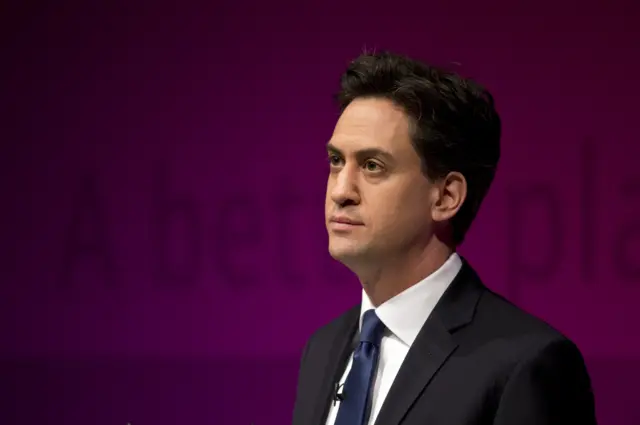 Image source, Getty/AFP
Image source, Getty/AFPSome Budget measures came from Ed Miliband's Labour manifesto
 Duncan Weldon
Duncan Weldon
Economics correspondent
July 9th
The stories around today include post-Budget political and economic reaction and Greece's new proposals. Will they be accepted by the Eurozone leaders?
Mark Urban, Diplomatic and defence editor
 Image source, Getty Images
Image source, Getty ImagesWith hindsight you can might say there were hints from Michael Fallon, the Defence Secretary, and briefings from those around George Osborne that defence would escape the worst effects of what was widely expected to be an austerity budget. But even so,today's announcement - that the forces' budget would meet the 2% of GDP Nato target until 2020 - caught many Whitehall insiders by surprise.
During the election campaign it was calculated that this would add £6bn a year to military spending by 2020, but with new economic growth projections that figure could be even higher.
One person who can say, "I told you so," is former Nato Secretary General Anders Fogh Rasmussen. Back in spring, weeks before the election, he told me - as we finished an interview for Radio 4 - that he was confident the UK would meet the 2% target, that he had received assurances to that effect from No 10, and that this would only be announced after the country had gone to the polls. As the Nato chief during September 2014's Wales Summit, when that spending target had been set, he had a very particular interest in this.
Try as I could, I couldn't find a second source for what Mr Rasmussen had told me, and we had finished recording when he said it, so the story went no further. As the election campaign continued, both the Conservatives and Labour refused to commit to the 2% target and many, including senior officers in the forces, concluded heavy cuts were on the cards.
Not only did the Conservatives allow themselves to be painted as a party about to take an axe to cherished regiments or warships, but they remained true to the political logic of that position. So, for example, when Andrew Neil and I cross examined the party defence spokespeople late in April, for the Daily Politics Defence and Security Debate, Mr Fallon would not concede that threats to Britain's security had increased - despite events in Ukraine or the rise of the Islamic State group.
Now that he can count on a substantially bigger budget, he will presumably have to change this position, and argue that the UK is buying new maritime patrol aircraft or fighter planes because a worsening international security environment demands it. What a difference a (Budget) day makes.
So unexpected is this turn of events that many Whitehall-watchers have been looking for small print, a catch that might mean the government isn't being quite as generous as it suggests. Attention focused first on a new £1.5bn Security Fund for the intelligence and counter terrorist people, also announced today, but apparently, no, that's quite separate to the defence pledge. Then others asked whether some spending such as war pensions or peacekeeping operations, might get lumped into the MoD's budget, eating away at the increase.
While we cannot yet categorically rule out such budgetary sleight of hand, there can be no doubt that, particularly towards the end of the Parliament, there will still be substantially more cash going through Defence.
Many have been asking me today "why on earth didn't they say this before the election?" The explanation that they hadn't yet done the sums back in April doesn't hold water - assurances had been given to certain people like Mr Rasmussen. I understand similar signals had been given privately to the US.
So what do we conclude from all this? That in an election where the health service and benefits cuts were key battlegrounds, even a party that historically has prided itself as strong on defence feels unable to make the argument for spending more on it. As the top brass and contractors ease the champagne corks, celebrating their unexpected good fortune, that's worth remembering.